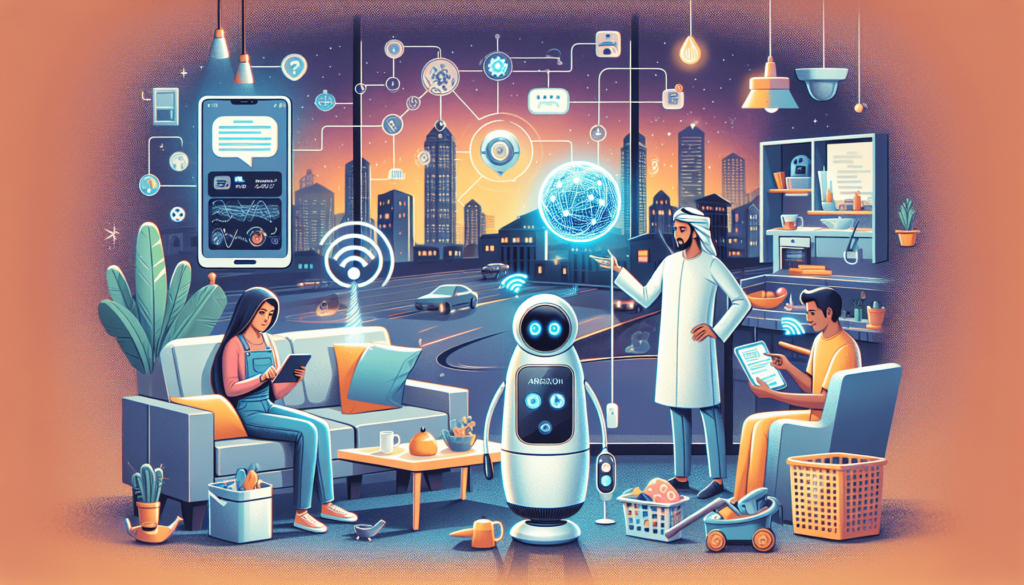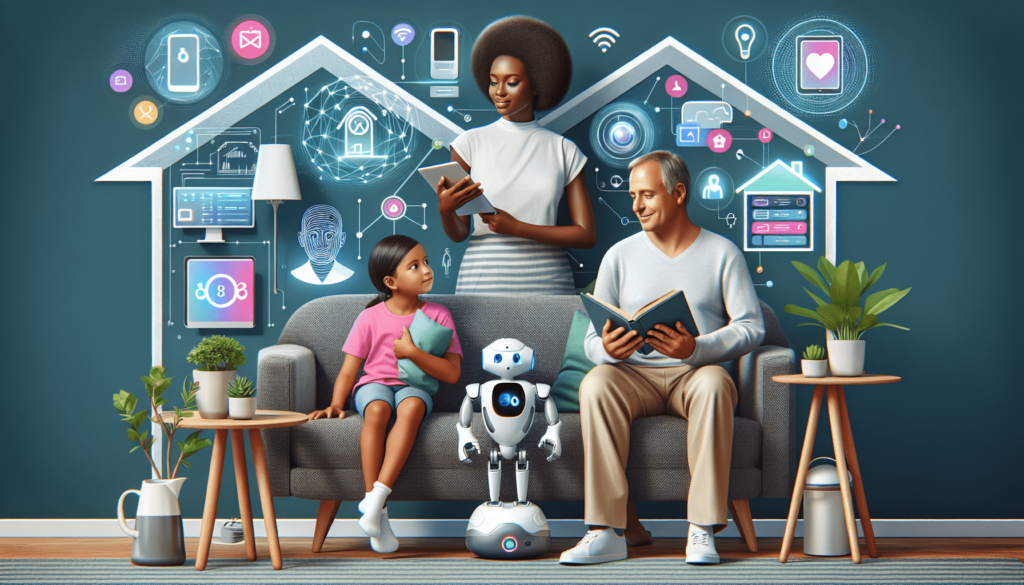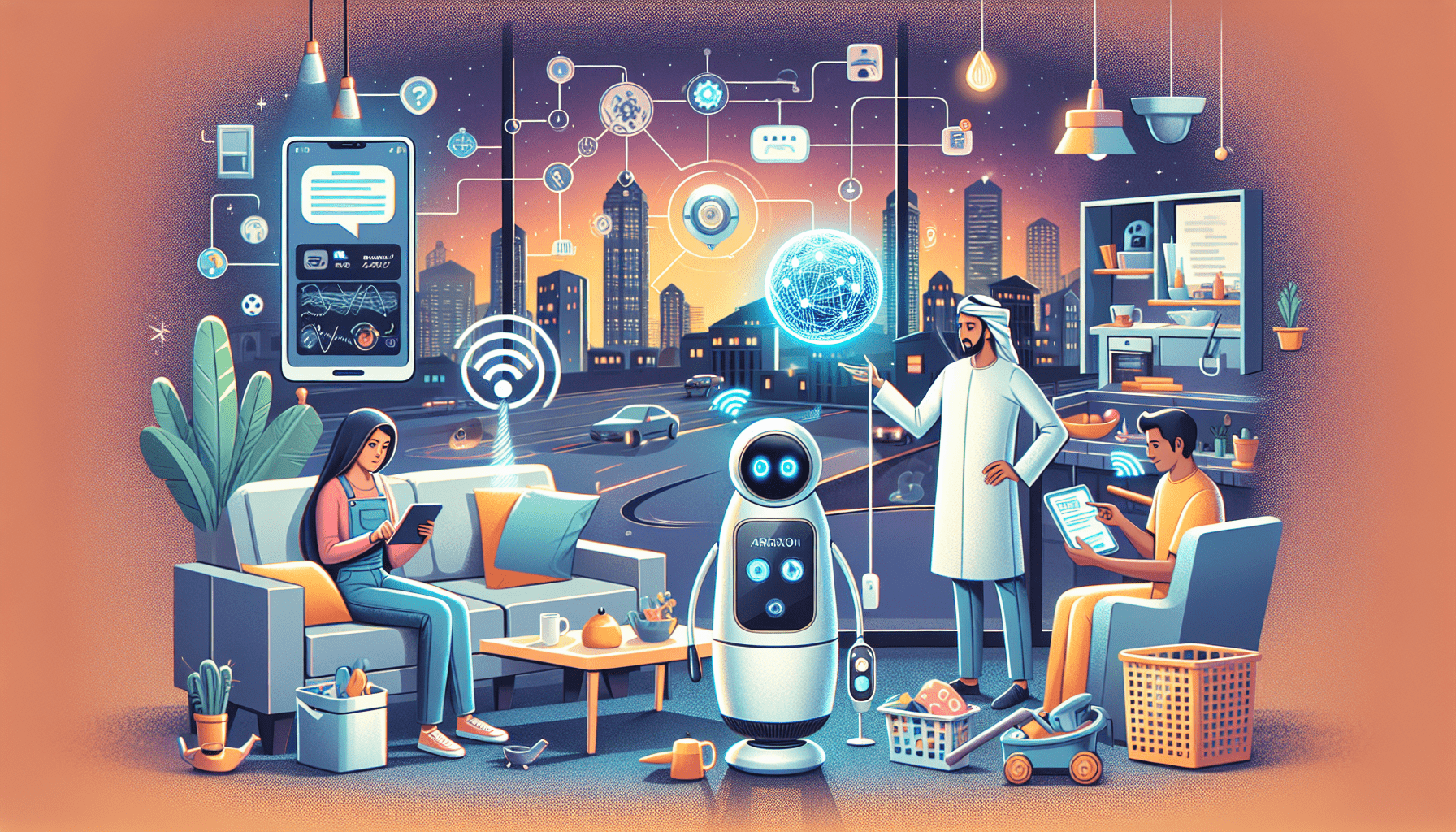Imagine a world where your home knows your needs before you even realize them – where mundane tasks are automated, and your surroundings adapt to your preferences seamlessly. This is the vision of Artificial Intelligence (AI) for home use. AI for home use refers to the integration of intelligent systems and technologies in our daily lives, transforming our homes into smart, interactive environments. From voice-controlled virtual assistants to energy-efficient thermostats, AI is revolutionizing the way we live, making our lives easier, more convenient, and ultimately more enjoyable.

What is AI?
Definition
AI, or Artificial Intelligence, refers to the development of computer systems that can perform tasks and make decisions that would typically require human intelligence. It involves simulating human thought processes and learning capabilities, enabling machines to understand, analyze, and respond to information in a smart and efficient manner.
Types
There are various types of AI that can be utilized in different scenarios. One type is called Narrow AI, which is designed to perform specific tasks or solve particular problems, such as voice recognition or image processing. Another type is General AI, which aims to possess the same level of intelligence as a human being and is capable of performing any intellectual task a human can do. However, General AI is still largely theoretical and not yet fully realized.
Applications
AI has a multitude of applications in various industries, and its integration into homes has become increasingly popular. From smart speakers to personal assistant robots, AI devices are transforming the way we live. These devices are designed to enhance convenience, efficiency, and even safety within our homes. They can perform a range of tasks, including answering questions, managing schedules, controlling household appliances, and even monitoring our health and well-being.
AI Devices for the Home
Examples of AI Devices
The market for AI devices for the home is continually expanding, with an impressive array of products available. Some popular examples include smart speakers like Amazon Echo and Google Home, smart thermostats like Nest Learning Thermostat, home security systems equipped with facial recognition capabilities, personal assistant robots like Jibo, and smart appliances such as AI-enabled kitchen appliances.
Benefits of AI Devices
AI devices bring numerous benefits to the home environment. They can simplify daily tasks, making them more efficient and convenient. For example, a smart speaker can play your favorite music, answer questions, and control other connected devices through voice commands. Smart thermostats can learn your temperature preferences and adjust accordingly, leading to energy savings and increased comfort. Home security systems with AI integration enhance safety by detecting suspicious activities and sending alerts to homeowners.
Concerns about AI Devices
While AI devices offer immense potential, there are also some concerns surrounding their use in homes. One major concern revolves around privacy and data security. AI devices often collect and process personal data, raising questions about how this information is used, stored, and protected. Additionally, there are concerns about bias and discrimination in AI algorithms, which can lead to unfair outcomes. There is also the worry that excessive reliance on AI devices may result in a loss of human skills and create a dependency on technology.
Smart Speakers
Features of Smart Speakers
Smart speakers are AI-powered devices that utilize voice recognition technology to interact with users and perform various tasks. They typically have built-in speakers and integrated virtual assistants, allowing users to play music, get weather updates, set reminders, control smart home devices, and more, simply by using voice commands.
Popular Smart Speaker Brands
Some of the most popular smart speaker brands include Amazon Echo, Google Home, and Apple HomePod. Each brand offers its own unique features and capabilities, catering to different user preferences. Amazon Echo, powered by Alexa, has a vast range of third-party integrations, making it highly versatile. Google Home, powered by Google Assistant, excels in delivering accurate search results and seamlessly integrating with other Google services. Apple HomePod, powered by Siri, offers superior sound quality and deep integration with the Apple ecosystem.
Virtual Assistants
Virtual assistants are an essential component of smart speakers, providing users with the ability to interact with the device using natural language. These assistants can answer questions, provide recommendations, set alarms, control smart home devices, and even engage in casual conversation. The most well-known virtual assistants include Amazon’s Alexa, Google Assistant, and Apple’s Siri. These assistants continuously learn and improve their responses based on user interactions, becoming increasingly personalized and intelligent over time.
Smart Thermostats
How Smart Thermostats Work
Smart thermostats are designed to optimize energy consumption and enhance comfort by intelligently controlling heating, ventilation, and air conditioning (HVAC) systems. These devices use a combination of sensors, algorithms, and connectivity to monitor temperature, occupancy, and user preferences. By learning from user behavior, detecting patterns, and gathering data from external sources like weather forecasts, smart thermostats can automatically adjust temperature settings to ensure efficient energy usage and tailor the indoor climate to the user’s preferences.
Energy Efficiency Benefits
One of the primary benefits of smart thermostats is their ability to increase energy efficiency. By automatically adjusting temperature settings based on user behavior and external factors, these devices can avoid unnecessary energy consumption. This not only leads to lower energy bills but also helps reduce the overall environmental impact of heating and cooling systems. Smart thermostats can provide insights and analytics on energy usage, empowering homeowners to make informed decisions about conserving energy.
Controlling HVAC Systems
In addition to energy-saving features, smart thermostats offer convenient control over HVAC systems. Users can remotely adjust temperature settings through smartphone apps or voice commands via integrated virtual assistants. This allows for effortless temperature management, whether you’re at home or away. Some smart thermostats even have geofencing capabilities, automatically adjusting temperature settings based on the user’s proximity to the home. Overall, these devices simplify temperature control, increase comfort, and offer greater flexibility in managing heating and cooling systems.

Home Security Systems
AI Integration in Home Security
AI integration has significantly advanced home security systems, making them more intelligent and effective in safeguarding our homes. AI algorithms can analyze data from various sensors, cameras, and other devices to detect potential threats or suspicious behavior. By continuously learning from patterns and anomalies, these systems can adapt and improve their detection capabilities over time. AI-powered home security systems can provide real-time alerts and notifications, allowing homeowners to take immediate action if necessary.
Smart Cameras and Facial Recognition
One notable application of AI in home security is the integration of smart cameras with facial recognition technology. These cameras can differentiate between familiar faces and strangers, providing an added layer of security. Facial recognition allows for personalized identification, granting access to authorized individuals while alerting homeowners to unrecognizable faces. This technology can help prevent unauthorized access, intrusions, and potential theft, enhancing the overall security of the home.
AI-Powered Monitoring Systems
AI-powered monitoring systems offer comprehensive surveillance of the home environment. These systems can detect and analyze activities, such as motion, sound, and temperature changes, to assess the safety and well-being of occupants. Through machine learning algorithms, the monitoring systems can learn to distinguish normal activities from abnormal ones, triggering alerts in case of potential dangers or emergencies. AI integration in monitoring systems provides homeowners with peace of mind and a heightened sense of security.
Personal Assistant Robots
Tasks and Functions
Personal assistant robots are designed to assist users with various tasks and enhance daily life. These robots can perform functions such as answering questions, providing reminders, managing schedules, playing music, and controlling smart home devices. They often utilize AI and natural language processing to understand and respond to user commands, making the interaction feel more conversational and intuitive.
Examples of Personal Assistant Robots
Several personal assistant robots have gained prominence in recent years. For instance, Jibo is a social robot that can engage in conversations, recognize faces, and capture photos through voice commands. Another popular example is Pepper, a humanoid robot that can interpret human emotions and provide companionship. These robots aim to provide helpful and personalized assistance, catering to individual needs and preferences.
Enhancing Daily Life
Personal assistant robots bring a new level of convenience and support to our daily lives. They can act as companions, entertainers, or even educational tools. These robots can provide companionship to the elderly, engage children in learning activities, or assist individuals with disabilities in performing daily tasks. By automating certain routines and offering personalized assistance, personal assistant robots aim to enhance independence, improve well-being, and simplify daily life for their users.
Smart Appliances
AI-Enabled Kitchen Appliances
Smart appliances with AI integration have revolutionized the kitchen experience. These appliances, such as smart refrigerators, ovens, and coffee makers, have the ability to learn user preferences and suggest recipes, adjust cooking settings, and even order groceries when supplies are running low. AI-enabled kitchen appliances can adapt to users’ cooking habits, providing convenience, efficiency, and an enhanced culinary experience.
Benefits of Smart Appliances
Smart appliances offer numerous benefits to homeowners. They provide remote control and monitoring capabilities, allowing users to manage their appliances from anywhere through mobile applications. These appliances can also optimize energy usage and reduce waste by adjusting settings based on usage patterns and real-time data. Additionally, smart appliances can simplify daily chores, automate repetitive tasks, and save time for users, making the overall household experience more enjoyable and efficient.
Smart Home Automation
Smart appliances play a significant role in the broader concept of smart home automation. By integrating with other AI devices, such as smart speakers and personal assistant robots, smart appliances can be seamlessly controlled and coordinated. For example, a user can ask a smart speaker to preheat the oven while they’re on their way home or instruct a personal assistant robot to start brewing coffee in the morning. Smart home automation creates a cohesive ecosystem where devices work together to streamline daily routines and enhance convenience.
Smart Home Automation
Controlling Devices Remotely
Smart home automation provides the convenience of remotely controlling various devices within the home. Through smartphone apps or voice commands, users can turn lights on and off, adjust temperature settings, lock doors, and even activate home entertainment systems from anywhere. This feature is particularly valuable for homeowners who want to ensure their home is secure or want to create a comfortable environment before arriving.
Automating Daily Routines
AI integration in smart home automation allows for the automation of daily routines. For example, you can program your smart home system to automatically adjust the thermostat when you leave for work or set the lights to turn on gradually in the morning to simulate a natural sunrise. By automating these routines, homeowners can save time, improve energy efficiency, and experience a more streamlined and comfortable living environment.
Integration with AI Assistants
Smart home automation can be seamlessly integrated with AI assistants, such as smart speakers or personal assistant robots. This integration enables users to control their entire smart home ecosystem through voice commands or mobile apps. For example, users can instruct their AI assistant to dim the lights, lock the doors, and set the temperature, all with a single command. The integration of AI assistants with smart home automation creates a cohesive and intelligent system that enhances convenience and simplifies home management.
Healthcare and Wellness Devices
AI in Healthcare
AI has made significant advancements in the healthcare industry, and its integration in home devices is improving personal healthcare and wellness management. AI-powered healthcare devices can monitor vital signs, track medication schedules, and provide personalized health recommendations. By analyzing data and patterns, these devices can help individuals manage chronic conditions, promote healthy habits, and provide early detection of potential health issues.
Wearable Health Trackers
Wearable health trackers, equipped with AI capabilities, have become increasingly popular in promoting personal health and wellness. These devices, such as fitness bands or smartwatches, can monitor heart rate, sleep patterns, activity levels, and even stress levels. With AI algorithms, wearable health trackers can provide actionable insights, personalized recommendations, and real-time feedback to empower individuals to make informed decisions about their well-being.
Smart Sleep Systems
AI-powered smart sleep systems aim to enhance the quality of sleep. These systems consist of smart mattresses or sleep-tracking devices that monitor sleep patterns, detect disturbances, and provide feedback on sleep quality. By integrating with other smart home devices, such as smart lighting or smart thermostats, smart sleep systems can create an optimal sleep environment by adjusting lighting, temperature, or even playing soothing sounds. AI integration in sleep systems can improve sleep health, leading to increased productivity and overall well-being.
Concerns and Ethical Considerations
Privacy and Data Security
One of the significant concerns surrounding AI devices for the home is privacy and data security. As these devices collect and process personal data, there is a potential risk of data breaches or unauthorized access to sensitive information. It is crucial for manufacturers to prioritize robust security measures to protect user data and ensure privacy. Additionally, users must be mindful of the data they share and understand the privacy policies associated with their AI devices.
Bias and Discrimination
AI algorithms can inadvertently perpetuate bias and discrimination if not designed thoughtfully. Machine learning models rely on data, and if the training data is biased, the AI system may produce biased or discriminatory outputs. It is essential for developers to actively address bias within AI algorithms and ensure transparency and accountability in the decision-making processes. Continuous monitoring and auditing of AI systems can help identify and rectify any instances of bias or discrimination.
Dependency on AI
As AI devices become increasingly integrated into our daily lives, there is a concern about dependency on technology. Excessive reliance on AI devices may diminish human skills and create a reliance on machines for routine tasks. It is important to strike a balance between utilizing AI to enhance convenience and efficiency while retaining human capabilities and critical thinking. Encouraging users to maintain a level of autonomy and not solely depend on AI devices is crucial for preserving individual skills and decision-making abilities.
In conclusion, AI devices for the home offer numerous benefits and opportunities for enhancing our lives. From smart speakers and thermostats to personal assistant robots and smart appliances, these devices bring convenience, efficiency, and even improved healthcare to our living spaces. However, it is essential to consider concerns about privacy, bias, and dependency on AI as we continue to embrace and integrate these devices into our homes. By understanding the capabilities and limitations of AI devices, we can make informed decisions about adopting and using them responsibly.
